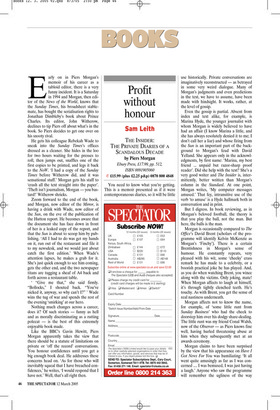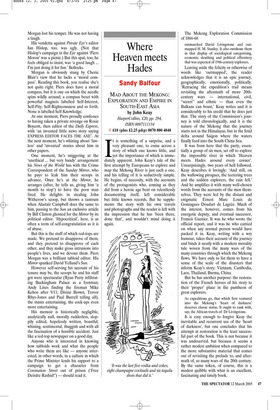Profit without honour
Sam Leith
Early on in Piers Morgan’s memoir of his career as a tabloid editor, there is a very funny incident. It is a Saturday in 1994 and Morgan, then editor of the News of the World, knows that the Sunday Times, his broadsheet stablemate, has bought the serialisation rights to Jonathan Dimbleby’s book about Prince Charles. Its editor, John Witherow, declines to tip Piers off about what’s in the book. So Piers decides to get one over on his snooty rival.
He gets his colleague Rebekah Wade to sneak into the Sunday Times’s offices dressed as a cleaner. She hides in the loo for two hours waiting for the presses to roll, then jumps out, snaffles one of the first copies to be printed, and legs it back to the NoW. ‘I had a copy of the Sunday Times before Witherow did, and it was sensational stuff.’ Morgan gets his staff to ‘crash all the text straight into the paper’. ‘Theft isn’t journalism, Morgan — you bastard!’ Witherow shrieks.
Zoom forward to the end of the book, and Morgan, now editor of the Mirror, is having a drink with Wade, now editor of the Sun, on the eve of the publication of the Hutton report. He becomes aware that the document she has face down in front of her is a leaked copy of the report, and that the Sun is about to scoop him by publishing. ‘All I had to do was get my hands on it, run out of the restaurant and file it to my newsdesk, and we would just about catch the first edition.’ When Wade’s attention lapses, he makes a grab for it. She’s just quick enough to see him coming, gets the other end, and the two newspaper titans are tugging a sheaf of A4 back and forth across a restaurant table.
‘ “Give me that,” she said firmly. “Bollocks,” I shouted back. “You’ve nicked it, anyway, so why can’t I?” ’ Wade wins the tug of war and spends the rest of the evening ‘smirking’ at our hero.
Nothing much changes across a career, does it? Of such stories — funny as hell and as morally discriminating as a rutting polecat — is the best of this extremely enjoyable book made.
Like the BBC’s Gavin Hewitt, Piers Morgan apparently takes the view that there should be a statute of limitations on private or ‘off the record’ conversations. You honour confidences until you get a big enough book deal. He addresses these concerns head on. ‘As for those who will inevitably squeal that I have breached confidences,’ he writes, ‘I would respond that I have not.’ Well, that’s all right then. use historically. Private conversations are imaginatively reconstructed — as betrayed in some very weird dialogue. Many of Morgan’s judgments and even predictions in the text, we have to assume, have been made with hindsight. It works, rather, at the level of gossip.
Even the gossip is partial. Absent from index and text alike, for example, is Marina Hyde, the younger journalist with whom Morgan is widely believed to have had an affair (I know Marina a little, and she has always resolutely denied it to me; I don’t call her a liar) and whose firing from the Sun is an important part of the background to Morgan’s feud with David Yelland. She appears only in the acknowledgments, by first name: ‘Marina, my best friend ... unpaid but razor-sharp proof reader’. Did she help with the text? She’s a very good writer and The Insider is, intermittently, better written than Morgan’s column in the Standard. At one point, Morgan writes, ‘My computer messages amused.’ That fey, intransitive use of the verb ‘to amuse’ is a Hyde hallmark both in conversation and in print.
But I digress. In book reviewing, as in Morgan’s beloved football, the theory is that you play the ball, not the man. But here, the balls is the man.
Morgan is occasionally compared to The Office’s David Brent (scholars of the programme will identify Kelvin McKenzie as Morgan’s ‘Finchy’). There is a certain Brentishness in Morgan’s sense of humour. He constantly repeats, very pleased with his wit, some ‘cheeky’ crass remark he has made to a celebrity, or a boorish practical joke he has played. And, as you do when watching Brent, you wince along with the victims. Only joking, mate! When Morgan affects to laugh at himself, it’s through tightly clenched teeth. He’s touchy. As with Brent, you get the sense of real nastiness underneath.
Morgan affects not to know the name, for example, of ‘some little runt from Sunday Business’ who had the cheek to doorstep him over his dodgy share-dealing. The little runt was my friend Conal Walsh, now of the Observer — as Piers knows fine well, having hurled threatening abuse at him when they subsequently met at an awards ceremony.
Morgan claims to have been surprised by the view that his appearance on Have I Got News For You was humiliating: ‘It all went quite amusingly as far as I was concerned .... I was bemused, I was just having a laugh.’ Anyone who saw the programme will remember the ugliness of the way Morgan lost his temper. He was not having a laugh.
His vendetta against Private Eye’s editor Ian Hislop, too, was ugly. (Not that Hislop’s campaign in the Eye against ‘Piers Moron’ was a picnic.) But this spat, too, he feels obliged to insist, was ‘a good laugh ... I’m just doing it for fun.’ Bollocks.
Morgan is obviously stung by Cherie Blair’s view that he lacks a ‘moral compass’. Reading this book, you realise she’s not quite right. Piers does have a moral compass, but it is one on which the needle spins wildly around; a compass beset with powerful magnets labelled Self-Interest, Self-Pity, Self-Righteousness and so forth. None is labelled Self-Knowledge.
At one moment, Piers proudly confesses to having taken a private revenge on Rosie Boycott, then editor of the Daily Express, with ‘an invented little news story saying EXPRESS EDITOR FACES THE AXE’. At the next moment, he’s whining about ‘lawless’ and ‘invented’ stories about him in other papers.
One moment, he’s sniggering at the ‘unethical ... but very handy’ arrangement his News of the World has with the Crime Correspondent of the Sunday Mirror, who he pays to leak him their scoops in advance. Once he’s at the Mirror, he arranges (after, he tells us, giving him ‘a month to stop’) to have the poor man fired. He delights in stealing John Witherow’s scoop, but throws a tantrum when Alastair Campbell does the same to him, passing to the Sun an exclusive article by Bill Clinton ghosted for the Mirror by its political editor. ‘Hypocritical’, here, is as often a term of self-congratulation as it is of abuse.
But this is the stuff of which red-tops are made. We pretend to disapprove of them, and they pretend to disapprove of each other, and they make gross intrusions into people’s lives, and we devour them. Piers Morgan was a brilliant tabloid editor. His Mirror spanked David Yelland’s Sun.
However self-serving his account of his tenure may be, the scoops he and his staff got were spectacular (Ryan Parry infiltrating Buckingham Palace as a footman; Andy Lines finding the fireman Mike Kehoe after 9/11; Divine Brown, Trevor Rhys-Jones and Paul Burrell telling all), the stunts entertaining, the cock-ups even more entertaining.
His memoir is historically negligible, analytically null, morally rudderless, sloppily edited, hopelessly written, boastful, whining, sentimental, thuggish and with all the fascination of a horrible accident. Just like a red-top newspaper on a good day.
Anyone who is interested in knowing how tabloids work and what the people who write them are like — anyone interested, in other words, in a culture in which the Prime Minister lends his support to a campaign to get a character from Coronation Street out of prison (‘Free Deirdre Rashid!’) — should read it.

































































 Previous page
Previous page